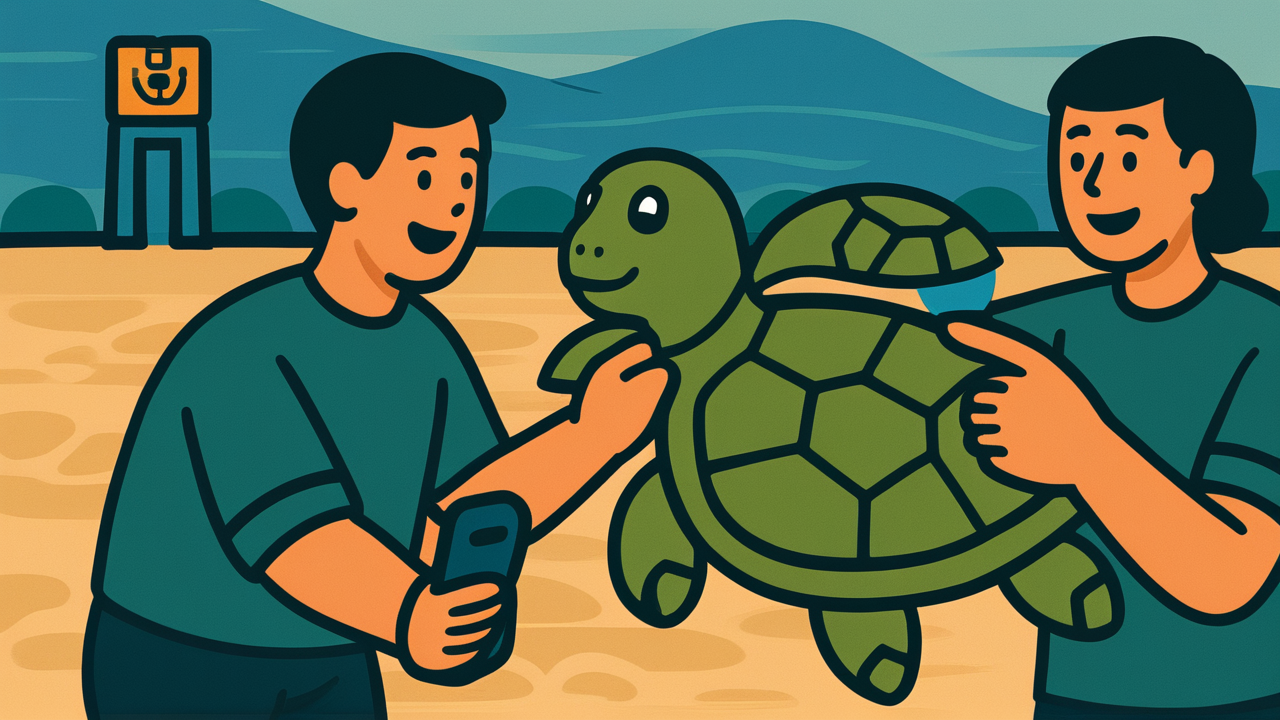How to Read “人捕る亀は人に捕られる”
Hitodoru kame wa hito ni toraruru
Meaning of “人捕る亀は人に捕られる”
This proverb means that those who trap or deceive others will ultimately meet the same fate themselves.
The expression “turtle that catches people” is used as a metaphor for cunning and dangerous beings. Like a turtle that suddenly emerges from underwater to attack people, it refers to individuals who catch their opponents off guard and ensnare them in traps. However, it teaches that even such cunning individuals will eventually be caught by someone and fall into the same kind of trap they themselves set.
This proverb is mainly used as a warning to those who commit evil deeds or to explain the principle of cause and effect. It is also sometimes used to mean “they will eventually receive their comeuppance” regarding villains who are temporarily successful. Even today, this expression is sometimes used when discussing fraudsters or those who commit wrongdoing.
Origin and Etymology
Regarding the origin of this proverb, the current situation is that no clear documentary evidence or established theory can be found. While the origin is uncertain, there are things we can infer from the structure of the phrase.
The expression “person-catching turtle” is thought to refer to large turtles that attack people or turtles as monsters that have appeared in Japanese folk tales and legends since ancient times. Japanese folktales from various regions preserve stories of giant turtles living in ponds and rivers that drag people underwater, and such folk traditions may form the background.
Additionally, the antithetical expression of “catching” and “being caught” is a structure commonly found in Japanese proverbs. Forms that contrast actions with their consequences, such as “If you curse someone, dig two graves” or “Seeds not sown will not grow,” are characteristic Japanese expressions that convey lessons in a memorable way.
Unfortunately, no reliable records have been found regarding when this proverb first appeared in literature or in which region it originated. However, based on its structure and content, it is presumed likely to have been passed down among the people since before the Edo period.
Usage Examples
- That company’s president deceived people extensively, but as they say “Person catching turtle is caught by person,” he was finally arrested for fraud
- No matter how clever the methods, “Person catching turtle is caught by person,” so flaws will eventually show
Modern Interpretation
In modern society, the meaning of this proverb has become more complex and multi-layered. In the information age, while methods of “catching people” have become remarkably sophisticated, the risk of “being caught” has similarly increased.
Internet fraud and information manipulation can truly be called the modern version of “person-catching turtles.” Methods that abuse digital technology, such as spreading false information on social media, phishing scams, and investment fraud, are evolving daily. However, at the same time, digital technology tends to leave evidence and has high traceability, so the probability of wrongdoers being “caught” has also increased.
Regarding corporate misconduct as well, the establishment of whistleblowing systems and strengthening of compliance structures have made concealment difficult. Problems that could once be pushed through with power now face strict social scrutiny, and once discovered, become major issues affecting corporate survival.
However, in modern times, the relationship between “catching” and “being caught” has become more complex. Due to globalization, cross-border crimes have increased, and methods of circumventing the law have become sophisticated. Additionally, with the development of AI and encryption technology, new crimes that are difficult to handle with conventional investigation methods have emerged.
Nevertheless, the essential lesson of this proverb remains unchanged. No matter how much technology advances, the universal truth that those who deceive others will eventually receive their comeuppance continues to live in modern society.
When AI Hears This
Modern people monitor others’ posts on social media, rate restaurants on review sites, and evaluate potential matches on dating apps. We act as “catching turtles” in digital spaces every day. But in reality, we are the ones being most skillfully “caught.”
Google knows our worries from our search history, Amazon predicts our desires from our purchasing patterns, and TikTok grasps everything from our viewing time to our psychological state. While we “monitor” others, algorithms continuously record our behavior 24/7, 365 days a year.
What’s particularly fascinating is the difference in monitoring “density.” Our observation of others is fragmentary and superficial, but the way digital platforms “capture” us is omnidirectional and continuous. Smartphone location data, heart rate, sleep patterns, even voice data—our biometric information has become part of the collection target.
The frightening aspect of this reversal lies in our illusion that we’re the ones doing the “catching.” When we rate restaurants, write product reviews, or criticize someone on social media, we feel like we’re in control. But in reality, all these actions are being stored in corporate databases and used as bait to “capture” us.
Lessons for Today
What this proverb teaches us today is the foolishness of deceiving others for short-term gain. In this era, information transparency has increased, and it has become increasingly difficult to continue keeping secrets.
What’s important is not being misled by immediate success, but building long-term trust relationships. Whether in business or human relationships, an honest and sincere attitude ultimately brings the greatest results. Directing the energy spent trying to outwit others toward one’s own growth and value creation is a far more constructive and sustainable path.
Additionally, this proverb teaches us the importance of humility. No matter how clever a plan we devise, humans have limitations, and oversights and carelessness inevitably arise. Rather, by building open and cooperative relationships, we can complement each other’s weaknesses and create a stronger foundation.
In modern society, it’s difficult to succeed alone. Relationships with trustworthy partners and companions become true assets. Keeping this proverb in mind, why don’t we choose to live honestly?



Comments